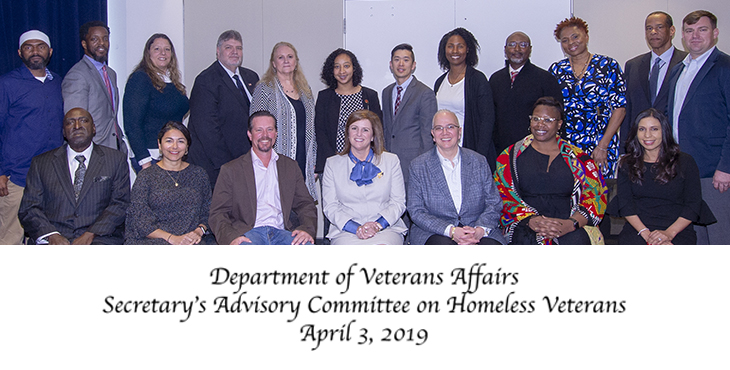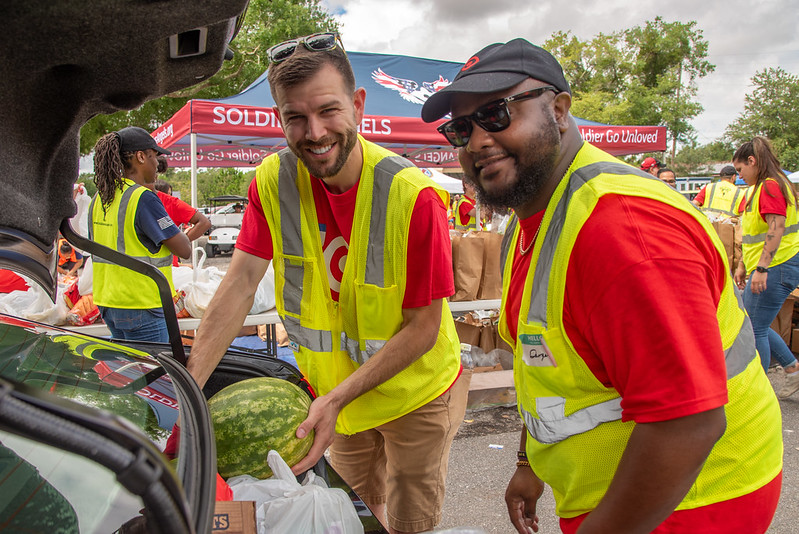The Secretary’s Advisory Committee on Homeless Veterans recently formed a panel of Veterans who have both utilized VA services and experienced homelessness. The panel met with the committee to inform its recommendations to the VA Secretary.
There is no better source of knowledge on homelessness than those who have experienced it. The committee’s recommendations to the Secretary will assist him in helping other Veterans exit homelessness.
One of the committee’s top goals was to influence VA messaging. It wanted to ensure that all Veterans who’re experiencing homelessness, or who’re at risk of homelessness, know they can come to VA for help. This includes Veterans with families, women Veterans, disabled Veterans, and minority Veterans.
The committee meets twice a year and travels to various cities to observe the city’s systems in place. Last year, the committee met in San Francisco to observe how a high-cost market has increased homelessness there, and how markets like this are testing innovative ways to create affordable housing for Veterans.
This year, the committee met in Washington, D.C., and will meet in Minnesota later this year. There, the committee will talk to leaders who have successfully adapted measures to end Veteran homelessness. The committee will then apply the lessons learned from those interactions to states and communities across the country.
Formation and goals
The VA Secretary’s Advisory Committee on Homeless Veterans operates under the provisions of the Federal Advisory Committee Act. It was founded on March 1, 2002, following the passage of the Homeless Veterans Comprehensive Assistance Act of 2001. This committee’s primary objective is to advise the Secretary on the provision of benefits and services to Veterans experiencing homelessness. This is one of VA’s top priorities.
The current committee is a diverse group of 15 experts who are knowledgeable about homelessness, housing, and health care. Five Veterans are on the committee, two of whom have experienced homelessness themselves. Committee members can be nominated by a third party, or they can self-nominate by submitting a resume and a brief cover letter to HomelessVets@va.gov. The committee reviews nominations every two years. The next recruitment cycle is in 2020, but the committee accepts nominations any time, in case an existing member resigns or leaves the board due to other circumstances. Nominees can opt to remain in consideration for the following cycle if they are not selected. Committee members can serve a maximum of two consecutive two-year terms.
The committee will continue to advise the Secretary on how best to meet homeless Veterans’ needs. With VA’s vision, leadership, and support for evidence-based practices, it’s possible to ensure that every Veteran has a place to call home.
More Information
- Visit the advisory committee’s website to learn more about the committee and its history.
- Visit VA’s Homeless Veterans website to learn about VA’s work and commitment to Veterans.
- Veterans who are homeless or at imminent risk of becoming homeless can call or visit their local VA medical center, where VA staff are ready to assist. Veterans and their families can also access VA services by calling 1-877-4AID-VET (1-877-424-3838).
Leisa Davis’ 28 years of federal government service includes time in finance, budget, performance reporting, strategic planning, project management, and executive meeting management.
Topics in this story
More Stories
Fewer female Veterans were homeless in 2024 than in 2023, but VA is committed to reducing that number to zero.
Army Veteran Mike McRae, once homeless, connects others with temporary housing at Gateway to Independence.
Soldiers' Angels volunteers provide compassion and dedication to service members, Veterans, caregivers and survivors.






Awwn! that is really nice of you guys. It’s always a happy moment, to see the government address the issue of homelessness.
really a great job, thanks for the article
Such a a good work, thanks for the information
The VA takes every chance to make it look like the veterans themselves are to blame for their homelessness. I fought for the better part of 3 1/2 years as an Air Force pilot in Vietnam, first based on Okinawa and then in Vietnam, extending my tour voluntarily twice. I received my honorable discharge in 1968, and for more than 50 years, I have not had one real job opportunity of any kind in the United States. The law says that I should have all kinds of rights to employment preference by the civil service and affirmative action by private contractors, but the Feres Doctrine prevents me from taking any action in the courts if the veterans’ laws are broken. In 1998, the Special Counsel forced the USDA Forest Service to hire me after two of its employees offered me $20,000 if I would “voluntary” withdraw from a Federal civil service selection in Alaska so that a much less qualified non-veteran could be selected. The offer of this job caused me to move from Germany at great cost, but after a few months, the Forest Service crooks broke their word and dismissed me in reprisal for reporting their bribe offer. I was never homeless and was able to raise three children only because I left the United States after earning a Master’s Degree and earned my Doctor of Natural Sciences degree and successfully completed my Habilitation in Germany. I also worked for almost six years in Brazil and could have been sponsored by Germany for a professorship in Argentina or Uruguay if I had changed my citizenship from American to that of a country in the European Union. I also have an American airline transport pilot’s license with more than 5300 flying hours and speak fluently in German, Portuguese, Thai, and Lao. I have also translated the better part of a book on freshwater fishes from Russian to English for publication and scored highest on more than 50 federal civil service examinations, most at the level of GS-15. The Office of Personnel Management illegally denied me veterans’ preference points on many of the examinations, but I still had the highest score on most. The Federal government simply broke the law and hired a non-veterans with lower scores for each vacancy. As a Vietnam veteran, I found I was wasting my time applying to American colleges and universities, where watchful Communists eliminate all war vets from consideration for jobs. The U.S. Department of Labor breaks the law by refusing to take action against those violating the Federal contract by excluding veterans from their faculties. It has also made a rule that only jobs paying less than $25,000 per year should be classified as “suitable for veterans.” My wife and I am now living on my 20% service-connected disability pension from the VA because of diabetes Type 2, which was caused by my exposure to TCDD in the herbicides used in Vietnam, which I was exposed to for most of 3 1/2 years. My chances of getting any job in the United States has been 0% since I received my honorable discharge in 1968, so my actual disability, as defined in several Supreme Court decisions under the Americans with Disabilities Act, would be 100%. The VA does not need to assemble a committee to study the homelessness of veterans. The reason is malfeasance and corruption of the Federal and state agencies funded to promptly find career employment for veterans immediately after discharge.
I am a homeless veteran. I need help in this program.
Hey buddy, hold on to who you are, who you want to be, and don’t give up on yourself.
With help from the VA, I managed to only have to spend 1 night sleeping in a friend’s car before I had a bed to sleep in. Initially to keep me off the street, I was in a place that also housed guys that had just been released from incarceration. I was uncomfortable because they have an entirely different outlook on the world in some ways, but I didn’t have any trouble and in about 5 weeks the VA got me into some transitional housing – I small one room apartment in a facility run by the Salvation Army. I was there for over 2 years before I got my HUD/VASH voucher and got into an apartment.
That might sound like a long time, but I was in a clean, safe place, I wasn’t on the street, and everyone there really wanted to help. I was even able to continue going to school and had a part time job for a while.
Contact the VA, tell them honestly what the situation is, and let them help. I don’t know you, so don’t take this personally, but I know some of us have anger issues and it definitely doesn’t help to take things out on the people trying to help.
Ask to be assigned to a social worker – these folks know what is available, what is possible, and how to find help while also acting as a buffer between you and the bureaucracy.
If a VA facility is not reasonably close (depending on your transportation situation), contact the nearest V.F.W., American Legion, or other civilian veterans organization – they are all vets themselves and they have contacts and know what is available in your area. Go ahead and talk to these guys, be honest about what you need and why – nobody can be much help if they don’t understand what you need.
Another way to find local info is to check the websites of the local community colleges or local university – almost all schools have a veterans office and many have Student Veterans Organizations staffed and run by vets. They are all familiar with the challenges we face, and don’t worry if you are an older vet – I just turned 62. Obviously the school doesn’t have beds available themselves, but the student vets have a LOT of contacts with local resources and the VA – their whole purpose is to help vets, primarily students, but they will gladly put you in contact with whatever help they can.
Don’t give up on yourself.
It’s always a happy moment, to see the government address the issue of homelessness. Especially to the poor. Great work US Government.
Thats really nice of you guys.